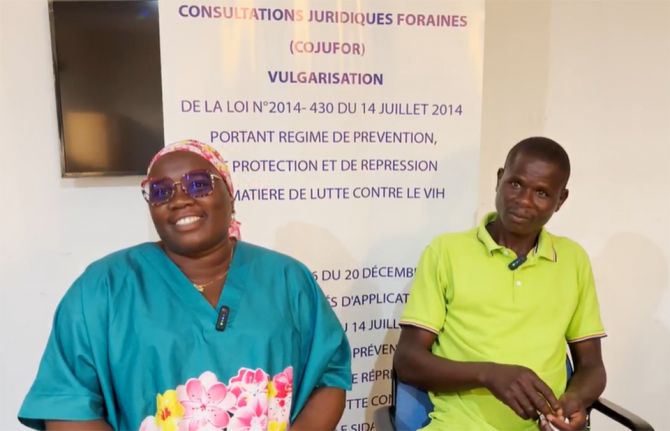
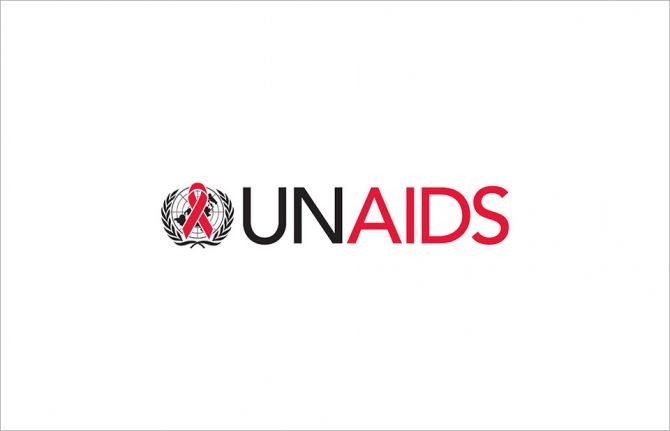
Update
Women’s rights advocates join UNAIDS to address sexual harassment
22 June 2018
22 June 2018 22 June 2018For decades, women’s rights leaders and civil society organizations have been actively working to advance gender equality. Civil society have also been critical partners to UNAIDS since its inception in 1996, UNAIDS being the only United Nations organization to include non-governmental organizations as active participants on its board.
The partnership between UNAIDS and civil society continues to be essential and on 18-19 June, UNAIDS and the ATHENA Network co-convened a meeting on addressing sexual harassment. The meeting provided a unique opportunity for dialogue with civil society on concerns and questions around sexual harassment and gender equality, as well as to provide valuable inputs on how to strengthen the work of UNAIDS in this area.
UNAIDS welcomed more than 30 women’s rights leaders and civil society advocates to share good practices, articulate concerns and discuss ways of moving forward to strengthen rights-based responses to sexual harassment and protect survivors and people who come forward to report incidents of harassment.
Participants expressed a wide range of perspectives on actions taken to date and demonstrated a shared commitment to work hand in hand with UNAIDS to ensure that sexual harassment both within and beyond UNAIDS is addressed and prevented.
They agreed that measures to transform organizational culture, ensure perpetrators are held to account and protecting survivors and whistle-blowers were central actions for UNAIDS to take. The importance of not only taking an inward approach but of also prioritizing efforts to promote gender equality and diversity, and put an end to gender-based violence as part of UNAIDS work to end AIDS globally was emphasized.
UNAIDS Staff Association shared results from a recent UNAIDS staff survey which found that 4% of staff had experienced some kind of sexual harassment within the workplace, yet only one person said they that they had come forward to report the incident. UNAIDS leadership outlined new measures UNAIDS is putting in place, including a confidential 24-hour hotline, training and 360-degree evaluations, to stop harassment of any kind within UNAIDS, ensure that staff are supported in reporting incidents and that any incidents reported are addressed immediately. UNAIDS has also recently launched a Gender Action Plan 2018-2023, which includes a series of measures to strengthen organizational culture.
Active discussions took place with and between civil society representatives who brought their personal experiences, reflections and inputs to strengthen current efforts being undertaken by UNAIDS and other stakeholders. The meeting also provided an opportunity to hold discussions with other Geneva-based United Nations organizations working to eliminate sexual harassment in the workplace.
The meeting builds on a series of discussions taking place around the world on the issue of sexual harassment, including those led by UNAIDS. These have included a dialogue with civil society and women leaders at the Commission on the Status of Women in March 2018, a virtual Town Hall meeting in May 2018–which engaged over 40 civil society leaders, as well as individual meetings held with civil society by UNAIDS senior management in Kenya, South Africa and other parts of the world.
UNAIDS will continue to continue to engage with women’s rights leaders and activists to learn from their experiences and draw on their expertise to develop and implement policies to address harassment in the workplace and to tackle the broader issues of gender inequality, gender-based violence and discrimination as central to efforts to end AIDS.
UNAIDS has taken a number of measures to reinforce its policy of zero-tolerance of sexual harassment. A five-point plan is being implemented to ensure that all forms of harassment and abuse of authority are identified early on, that measures taken are properly documented and that action follows due process and is swift and effective, with appropriate protection both for survivors and for whistle-blowers.
UNAIDS is also making it easier for people to report complaints in a secure and confidential way through an anonymous and confidential Integrity Hotline, which is open 24 hours a day, every day, and provides staff with an alternative way to report complaints.
In addition, UNAIDS has called for its Programme Coordinating Board Bureau to lead an Independent Expert Panel on harassment to provide policy recommendations on how UNAIDS can improve its response to harassment and identify areas where reform is needed.
UNAIDS has recently launched its Gender Action Plan 2018-2023, to ensure gender equality in the workplace as a human right and critical to the performance and effectiveness of UNAIDS.
Quotes
Addressing the issue of violence against women is a human rights imperative and a priority for me. I make a personal commitment to lead the culture change needed and implement the measures needed to prevent and address sexual harassment within UNAIDS and address pervasive violence against women and girls—in all their diversity—in our communities.
Sexual harassment, abuse of power, and violence are experiences too many people have endured, and now is a watershed moment to bring accountability and transformation. We as ATHENA co-convened this consultation as part of our long-standing work to ensure that women in all our diversity are a meaningful part of the decision-making that affects our lives, and so that a strong agenda toward accountability informed by women’s rights leaders and women-led civil society is embedded in the on-going work and governance of UNAIDS.
Our work through the five-point plan seeks to sensitize staff so they know their rights, they are protected and can report, and they are also empowered to hold leaders accountable. We are taking steps to clearly demonstrate that no form of harassment will be tolerated. We are doing key work to ensure an early and effective response.

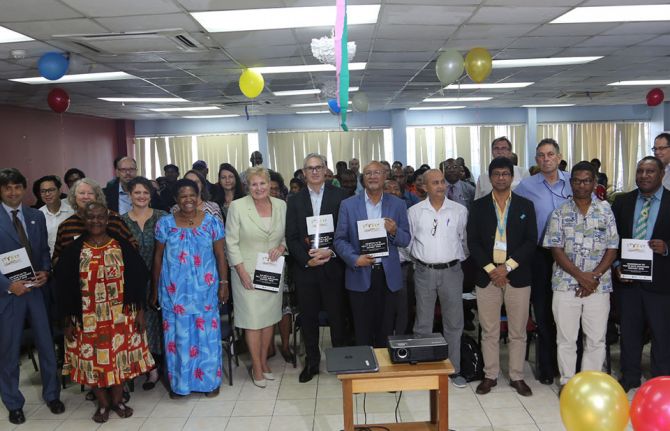
Update
Papua New Guinea launches its first report on key populations
21 May 2018
21 May 2018 21 May 2018Papua New Guinea has published the results of its first comprehensive survey on key populations in the country. The report is the conclusion of a study that collected estimates of the sizes of key population and biobehavioural data, which will be used to inform prevention and treatment services and policies for HIV and other sexually transmitted infections.
“Only when we ensure that Papua New Guinea’s HIV programming reaches the right people in the right way and place, and at the right time, will the increasing HIV infection rates amongst key populations be slowed,” said David Bridger, the UNAIDS Country Director for Papua New Guinea, at the report’s launch.
The study, Kauntim mi Tu (count us), was carried out in the three largest urban areas of the country—Port Moresby, Lae and Mount Hagen. It revealed that female sex workers, gay men and other men who have sex with men and transgender people often do not seek health care, get tested for HIV or other sexually transmitted infections or use condoms.
Members of key populations in the country face real and perceived stigma, discrimination and violence from police, clients and others in their communities on a daily basis, according to the report. High rates of stigma, discrimination and violence are deterring them from seeking or accessing health-care services.
A member of Friends Frangipani, an organization of sex workers, said, “Many of us live very difficult lives. We don’t all have access to clean water, healthy food or a safe space. We are struggling. Yet we are told to look after ourselves, protect ourselves from HIV and, if HIV-positive, stay healthy. That is very hard for many of us. People need to understand our lives better, and Kauntim mi Tu has done that.”
While adult female HIV prevalence is estimated at 1.1% nationally, the study found that prevalence was nearly 20% among female sex workers in Mount Hagen and almost 15% in the capital, Port Moresby. More than half of gay men and other men who have sex with men and transgender people were found to have never been tested for HIV. Three out of four men in the second largest city, Lae, reported having experienced violence related to their sexuality or sexual identity.
The study included biological testing, with participants offered point-of-care tests and, if needed, same-day treatment for syphilis, chlamydia and gonorrhoea. The research team included members of key populations.
The study’s principle investigator, Angela Kelly-Hanku, noted that much work remains to be done. “This work must be done in the context of safe, respectful and enabling environments that support adequate public health responses and invest in new and dynamic ways to increase HIV testing and ensure that treatment is continuously available, that viral load testing is standard HIV care and that prevention is paramount to everything. We cannot be complacent,” she said.
The report is available at http://www.aidsdatahub.org/sites/default/files/publication/PNG_Kauntim_mi_tu_Multi-Site_Summary_Report_from_the_Key_Population_IBBS_2018.pdf.
Key populations in the country
Region/country

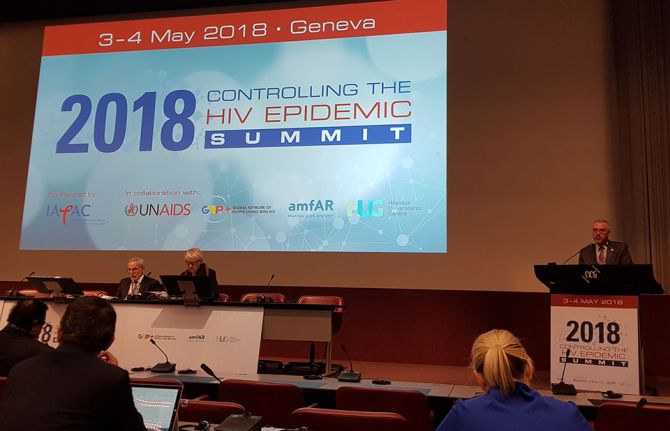
Update
Metrics matter in identifying gaps and key populations to find solutions in each country
04 May 2018
04 May 2018 04 May 2018The International Association of Providers of AIDS Care (IAPAC) hosted its 2018 Controlling the HIV Epidemic Summit in Geneva, Switzerland, on 3 and 4 May. Speakers at the summit discussed new metrics for assessing progress in national and subnational HIV responses as well as scaling up HIV services to include other health conditions, such as tuberculosis.
Soumya Swaminathan, the Deputy Director-General of the World Health Organization, gave the keynote address, emphasizing the importance of integrating and linking health services. For example, people living with HIV should have access to testing and treatment of noncommunicable diseases.
Tim Martineau, UNAIDS Deputy Executive Director, Programme, a.i., highlighted that in mid-2017 nearly 21 million people had access to treatment, but 15.8 million still did not. In addition, as of 2016, new HIV infections were off the 2020 target of fewer than 500 000 infections per year. He stressed that more needs to be done for key populations and young women and adolescent girls.
Deborah Birx, United States Global AIDS Coordinator and Special Representative for Global Health Diplomacy, explained how the United States President’s Emergency Plan for AIDS Relief zeroed in on 13 countries for epidemic control. Resources alone, she said, cannot bring about change. Political will, government commitment, reducing stigma and data analysis are key to ending AIDS. Once core policies are adopted based on programme needs and gaps, with community involvement, countries can really scale up national efforts, she said.
All agreed that one size does not fit all. The response has to be tailored to countries and segments of the population. Among the encouraging strategies are HIV self-testing kits, increasing nurses’ responsibilities, male corners where male nurses and doctors provide care and treatment and same-day treatment for people testing HIV-positive in order to avoid a second visit to health centres.
Quotes
“We have moved from an aspirational goal to a reality where tools are at our disposal to control national HIV epidemics without a vaccine or cure.”
“The work to end the AIDS epidemic needs to be built on one strong health system per country and one aligned global health community.”
“Community engagement and community-based services are critical for achieving our global targets for HIV testing, treatment and care.”
“It is key to use data to determine what has been done in the fight against AIDS and what needs to be done. Make the impossible possible.”
Related resources
Related

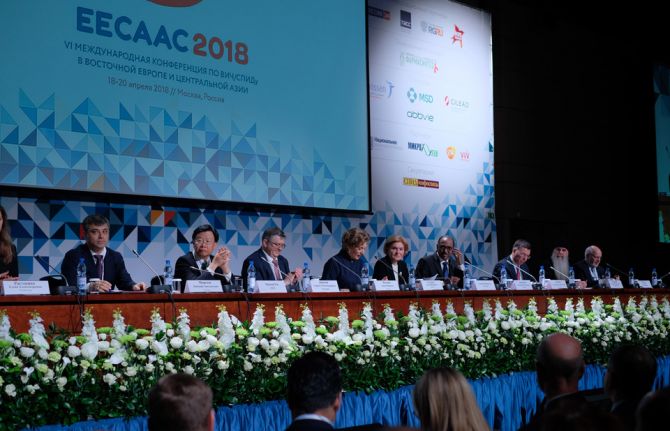
Update
Sixth Eastern Europe and Central Asia Conference on HIV/AIDS opens in Moscow
20 April 2018
20 April 2018 20 April 2018A record 3000 delegates from more than 60 countries, including representatives of civil society, scientific institutions, the private sector and governments, gathered in Moscow from 18 to 20 April 2018 to participate in the Sixth Eastern Europe and Central Asia Conference on HIV/AIDS. The conference focused on four major tracks: prevention, science and treatment, civil society, and international cooperation.
Eastern Europe and central Asia is the only region where the number of new HIV infections and AIDS-related death are still on the rise. The conference provides a unique opportunity to take stock of progress and discuss the challenges and transformation needed to get the eastern Europe and central Asia region on track to end AIDS.
The keynote speakers at the opening ceremony included Michel Sidibé, UNAIDS Executive Director, Olga Golodets, Vice Prime Minster of the Russian Federation, Anna Popova, Head of Russia’s Federal Service for Consumer Protection and Human Wellbeing, Alexsey Tsoy, Deputy Minister of Health of Kazakhstan, Alexander Pankin, Deputy Minister of Foreign Affairs of Russia, Lyudmila Rastokina, a representative of the Kazakhstan’s Union of People Living with HIV, and representatives of the private sector and others.
Despite the overall increase in HIV-related deaths and infections, in the past two years the eastern Europe and central Asia region has made progress in a few areas. For example, Armenia and Belarus were validated by the World Health Organization as having eliminated mother-to-child transmission of HIV. Most countries of the region adopted the test and treat approach and the average cost of first-line antiretroviral treatment has dropped from almost US$ 2000 per person, per year to less than US$ 200 per person, per year.
A number of key challenges were highlighted at the conference, including the fact that only 3% of total HIV expenditures in the region go for programmes focused on key populations, including people who inject drugs, migrants, sex workers, transgender people, prisoners and men who have sex with men. The region also faces the triple epidemics of HIV, tuberculosis and hepatitis C virus which require an integrated approach to prevention, diagnosis and treatment.
The conference was organized by the Russian Federation’s Federal Service for Consumer Protection and Human Wellbeing and UNAIDS.
Quotes
“Thanks to the efforts of scientists, the tireless work of doctors and civil initiatives, there is hope that we can defeat this disease. Russia consistently addresses this problem and actively works to counter HIV. The funding of specialized programmes grows each year and significant assistance is provided to Eastern European and Central Asian states for fighting this disease.”
“Russia has everything it needs to end AIDS and help other countries in the EECA region. UNAIDS stands ready to work with the Russian leadership to develop and launch a Fast-Track plan for the Russian Federation as an urgent priority. I hope that by the time we are gathered here again for EECAAC in 2020, the Russian Federation will have reached 90-90-90.”
“We are constantly monitoring the new treatment development, because it is important not only to buy medicine - we talk a lot about reducing its cost, the availability of this medicine in our country and abroad - but it is very important to form a culture of adherence to drug therapy, which is not so simple.”
“Let’s dream about the near future where in all countries of this region people who use drugs have access to harm reduction programmes, including substitution therapy and methadone. Where all countries in the region are using international evidence-based experience and countries do everything possible for rehabilitation of drug users.”
Speeches
Sixth Eastern Europe and Central Asia Conference on HIV/AIDS
Region/country
Related

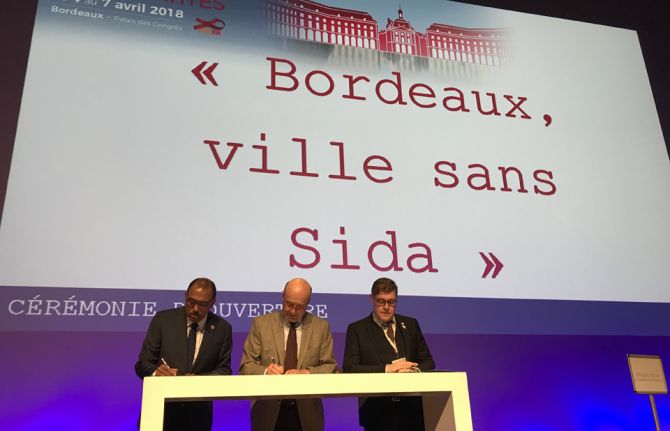
Update
Bordeaux signs Paris Declaration to end the AIDS epidemic in cities
05 April 2018
05 April 2018 05 April 2018On 4 April, Bordeaux became the latest city to sign up to the Paris Declaration to end the AIDS epidemic in cities. The Mayor of Bordeaux and former French Prime Minister Alain Juppé signed the declaration alongside UNAIDS Executive Director Michel Sidibé at the opening of AFRAVIH, the international francophone HIV and hepatitis conference being held in Bordeaux, France, from 4 to 7 April.
In signing the Paris Declaration, mayors commit to putting their cities on the Fast-Track to ending the AIDS epidemic. Mr Juppé committed to achieving the 90–90–90 targets—whereby 90% of people living with HIV know their HIV status, 90% of people who know their HIV-positive status are accessing treatment and 90% of people on treatment have suppressed viral loads—in Bordeaux in the next two years. He also committed to eliminating stigma and discrimination and developing a people-centred approach to the AIDS response. In addition, he said, it was crucial to educate young people on HIV, citing a lack of knowledge among French young people.
Since its launch on 1 December 2014, more than 250 cities and municipalities have signed the Paris Declaration. Leaders in those cities have recognized that their strategies for responding to the AIDS epidemic also offer them a platform to address the need for social inclusion, protection, safety and health.
With more than half of the world’s population currently living in cities and urban areas accounting for a large and growing proportion of people living with HIV, tuberculosis (TB) and other diseases, cities will play an essential role in ending AIDS. The risk of contracting, and vulnerability to, HIV and TB is often higher in urban areas compared to rural areas, owing to a number of reasons, including migration, unemployment and social and economic inequalities.
The AFRAVIH conference will focus on the 90–90–90 targets as well as innovations on HIV treatment and prevention and on scientific advances.
Quotes
“By signing this declaration, we commit to ensure that services are delivered to everyone in an equitable and efficient way. It’s not just HIV that is at stake, it’s a question of health overall.”
“We must push for further integration of health services and put fragile communities at the centre of our efforts. This is the way to build resilient communities and cities worldwide.”
“Regardless of whether Bamako is ahead of Bordeaux since we signed the Paris Declaration ahead of Bordeaux, our priority remains the same: HIV prevention and patient care so that we can eliminate AIDS.”
Region/country

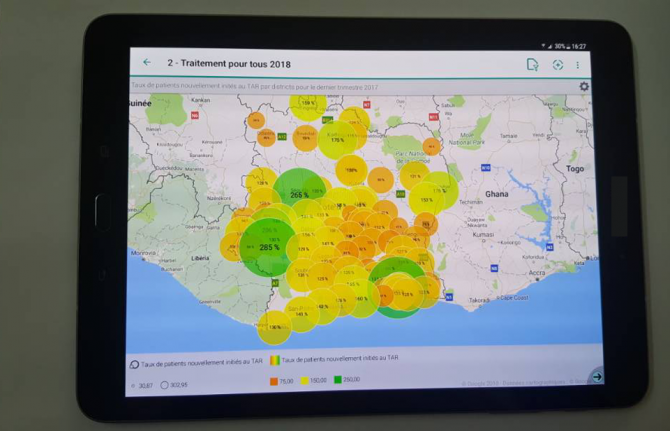
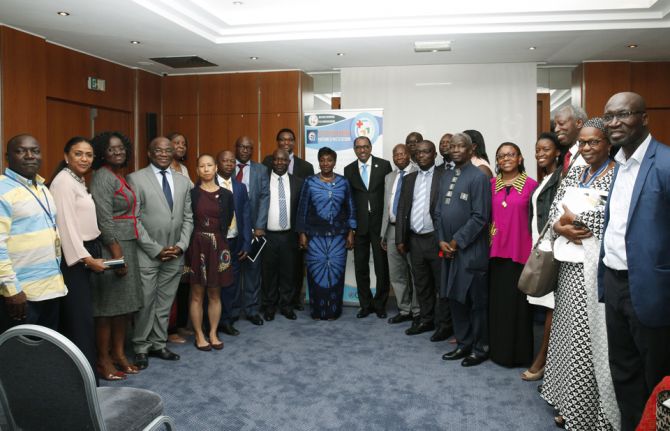
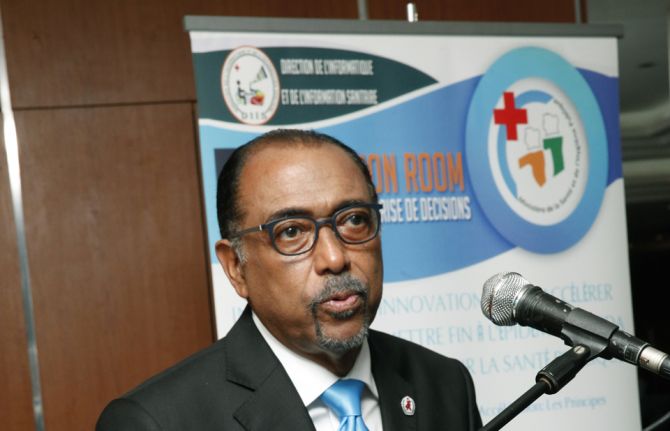
Update
Launch of HIV situation room in Côte d’Ivoire
27 March 2018
27 March 2018 27 March 2018Côte d’Ivoire has become the first francophone country, and the first in western and central Africa, to launch an HIV situation room, a software platform designed to support informed decision-making.
This innovative tool strengthens national information systems through real-time visualization of information from multiple data sets. It will enable leaders and programme managers to make timely decisions to improve health programmes to achieve the 90–90–90 targets, whereby 90% of people living with HIV know their HIV status, 90% of people who know their HIV-positive status are accessing treatment and 90% of people on treatment have suppressed viral loads, by 2020.
The situation room is the result of a collaboration between the Côte d’Ivoire Ministry of Health and Public Hygiene, the United States President’s Emergency Plan for AIDS Relief through the Centers for Disease Control and Prevention, and UNAIDS. It was launched by Raymonde Goudou Coffie, the Minister of Health and Public Hygiene of Côte d’Ivoire, and Michel Sidibé, Executive Director of UNAIDS, on 26 March in Abidjan.
Quotes
“The situation room will allow the use of epidemiological data, strategic information and community-based data in real time to assist decision-making.”
“The Ebola epidemic was only ended in Côte d’Ivoire thanks to a real-time information system. The development of health in the future will depend on our ability to show information in real time and the local level.”
“I congratulate UNAIDS for the situation room, which will help to improve the response in order to achieve the 90–90–90 targets.”
Region/country
Related

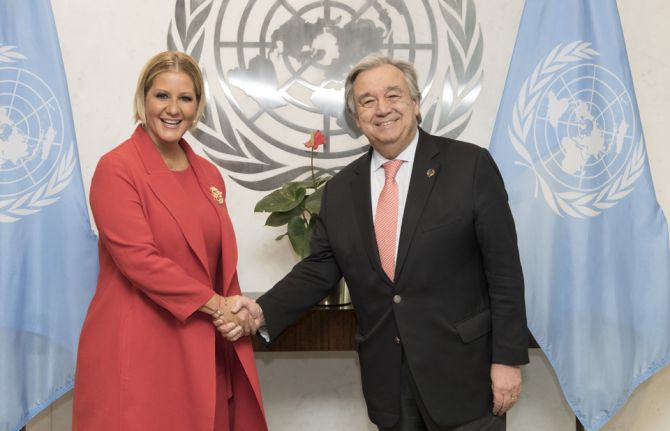
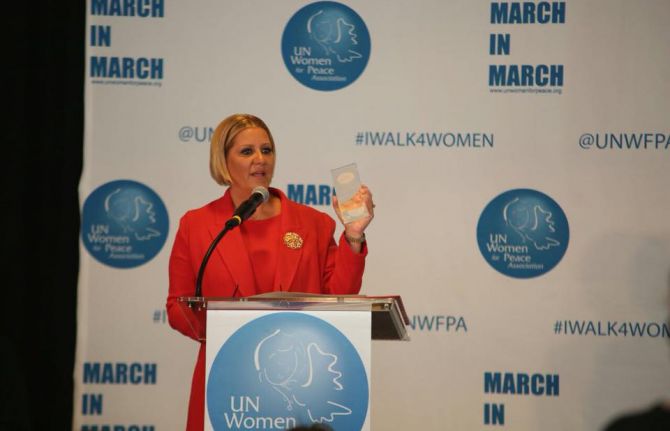
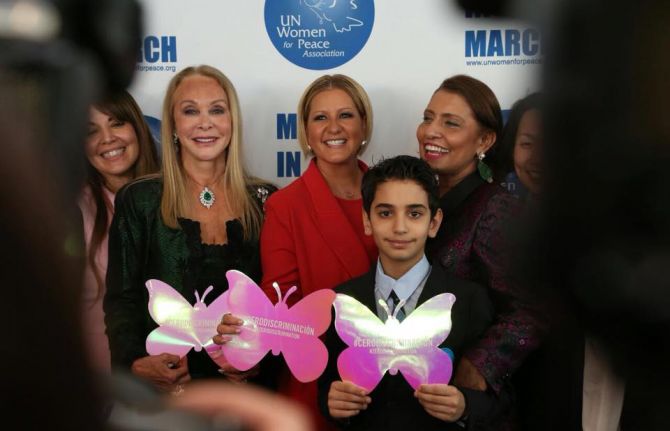
Update
UNAIDS Special Ambassador receives UNWDPA Leadership Award
23 March 2018
23 March 2018 23 March 2018The United Nations Women for Peace Association (UNWDPA) has honoured Lorena Castillo de Varela, the First Lady of Panama and UNAIDS Special Ambassador for AIDS in Latin America, with its Leadership Award. The award was made in recognition of her work in the response to HIV and the promotion of human rights and women’s empowerment.
Presented at the UNWDPA Annual Award Luncheon, held at United Nations Headquarters in New York, United States of America, on International Women’s Day, the award honours people who have made a difference to the lives of women and girls.
Since her appointment as a UNAIDS Special Ambassador in 2016, Lorena Castillo de Varela has led a zero discrimination campaign that has gone beyond the borders of Panama and become internationally recognized. In her role as Chairwoman of the National AIDS Commission, she catalysed support from 45 governmental institutions to sign an act of commitment to promote HIV prevention and zero discrimination.
Quotes
“Zero discrimination is the underlying message of everything I do. Each of us must continue to use our voices and actions to ensure that all people, especially young women, find their voices to embrace their right to live full and exceptional lives.”
“This award is testament to Lorena Castillo de Varela’s commitment to zero discrimination. She is a powerful and passionate advocate who works tirelessly to leave no one behind.”
UNAIDS Special Ambassador for AIDS in Latin America
Region/country


Update
UNAIDS saddened by the death of pioneering HIV researcher David Cooper
21 March 2018
21 March 2018 21 March 2018UNAIDS is saddened by the news of the sudden death of David Cooper on 18 March. He was a pioneering HIV researcher, immunologist and professor at Australia’s University of New South Wales and in 1986 became the first Director of the National Centre of HIV Epidemiology and Clinical Research, now known as the Kirby Institute.
Mr Cooper diagnosed the first documented case of HIV in Australia in the mid-1980s, and in 1991 was named Chair of the WHO Global Programme on AIDS’ Committee on Clinical Research and Drug Development.
He was a past President of the International AIDS Society and worked with colleagues to found the HIV Netherlands Australia Thailand Research Collaboration, known as HIV-NAT, in Bangkok, Thailand.
“The world has lost a bold and compassionate leader in the response to HIV,” said Michel Sidibé, UNAIDS Executive Director. “David Cooper firmly believed in health as a fundamental human right. Without the groundbreaking research and advances in treatment that he helped to make a reality, many more lives would have been lost to AIDS. Our thoughts during this difficult time are with his family, colleagues and the many people his life and work touched.”
Region/country

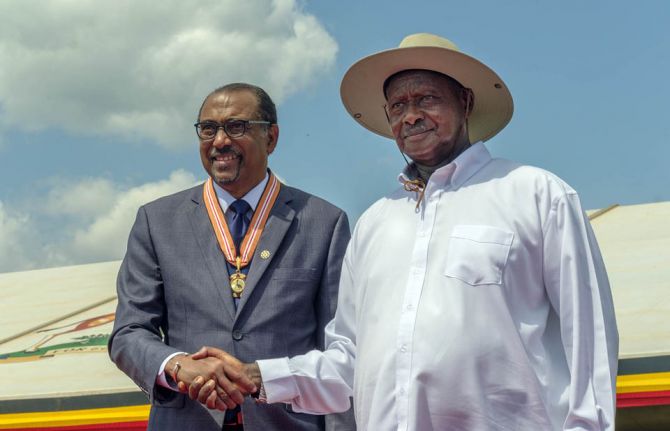
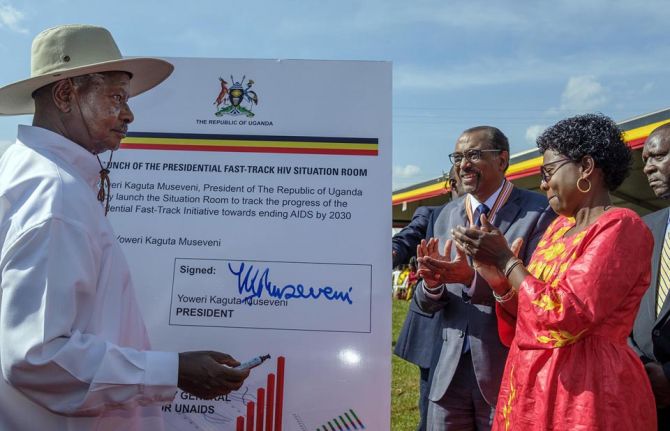
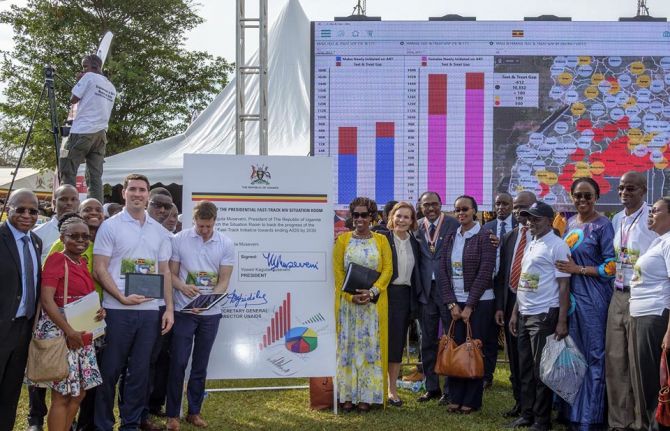
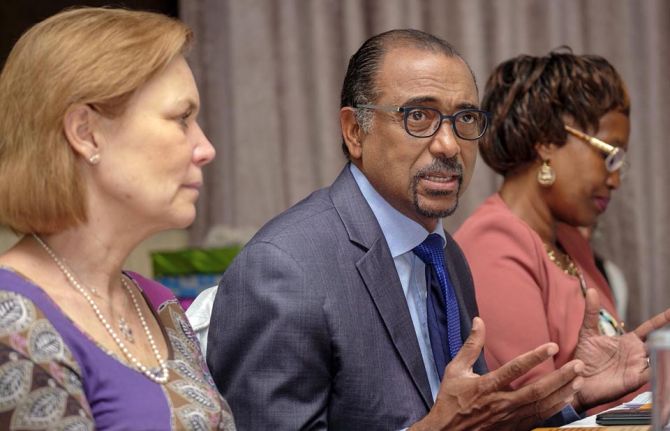
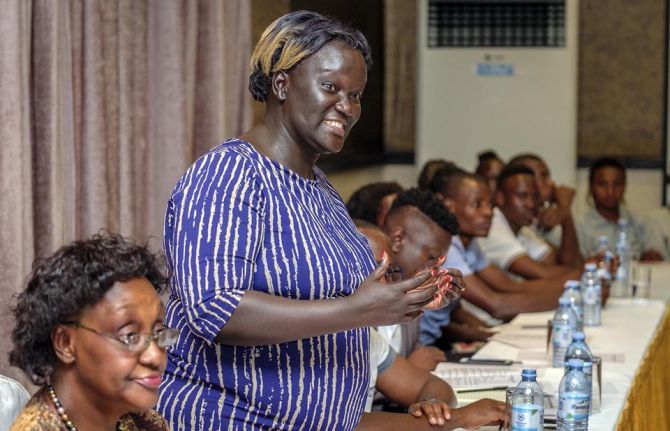
Update
International Women’s Day in Uganda
12 March 2018
12 March 2018 12 March 2018On International Women’s Day, which is celebrated on 8 March every year, Yosweri Museveni, President of Uganda, affirmed his commitment to empower women in the work place and in the domestic sphere. At an International Women’s Day celebration in Mityana District, in the Central Region of Uganda, President Museveni outlined the action taken by government to promote women in the civil service, including the army, police and in Parliament. Government is also currently developing legislation to promote the rights of women in the home.
During the event the President, in the presence of UNAIDS Executive Director, Michel Sidibé, launched the Presidential Fast-Track Situation Room, a data visualisation platform which draws from multiple sources to provide real-time data for monitoring the implementation of the Presidential Fast-Track Initiative to End AIDS in Uganda by 2030. The initiative is a multi-sectoral effort to consolidate progress on key areas of HIV prevention revitalize HIV prevention, testing and treatment.
In a special ceremony, the President awarded Mr Sidibé the Most Excellent Order of the Pearl of Africa, the highest civilian award of the Ugandan Honours System, in recognition of Mr Sidibé’s contribution to the global AIDS response and his continued support to the Government of Uganda and its partners.
Quotes
“Women are the foundation of our society. We must empower women. If girls and young women are not empowered they will remain vulnerable to HIV infection and violence. Uganda has taken steps to ensure this happens in the work place and the home.”
“I am pleased to celebrate International Women’s Day in Mityana District as a guest of President Museveni. His focus on transferring competencies, building a knowledge economy and education is empowering women and girls across Uganda.”
Region/country
Related

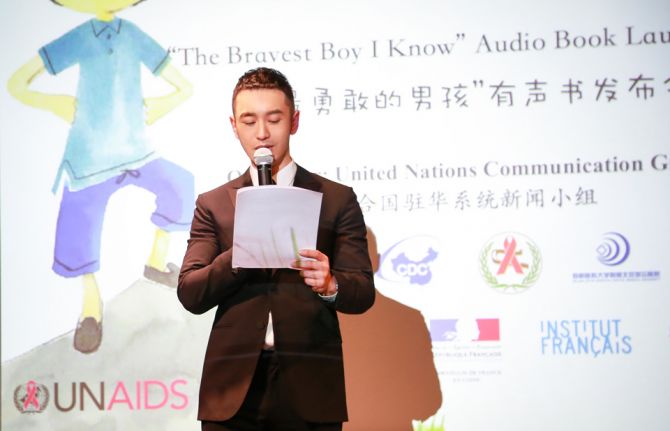
Update
Chinese audio version of award-winning children’s book The bravest boy I know launched
07 March 2018
07 March 2018 07 March 2018In commemoration of Zero Discrimination Day, the UNAIDS China Country Office has launched an audio adaptation of the award-winning children’s book The bravest boy I know.
The book tells the story of the heart-warming friendship between Xiao Ming, an eight-year-old living with HIV, and his best friend Xiao Li, sending the critical message that with treatment and support from families, friends and schools, children living with HIV can have a normal and happy childhood, and that children living with HIV have the right to a life free from discrimination, as other children do.
The audiobook was launched on 6 March in Beijing, China, by Huang Xiaoming, the renowned actor and UNAIDS Goodwill Ambassador for China. The aim of the new audiobook is to disseminate the message of zero discrimination among a younger audience. A short video also catering to the needs of children comes with the audiobook, both of which are available to download for free.
Quotes
“These are children who were born with HIV. They are young people yearning for a better future. The more I listen to their stories, the more I realize that discrimination like this could easily have happened to you and me.”
“Discrimination will not disappear without actively addressing the ignorance, practices and beliefs that fuel it. Ending discrimination requires action from everyone.”














